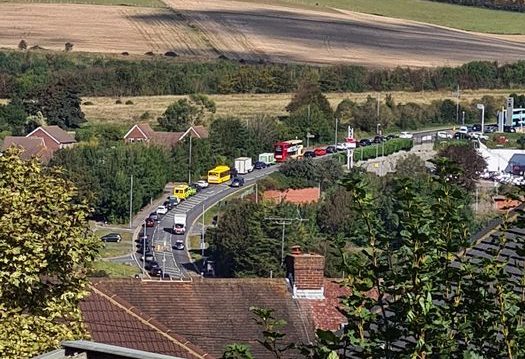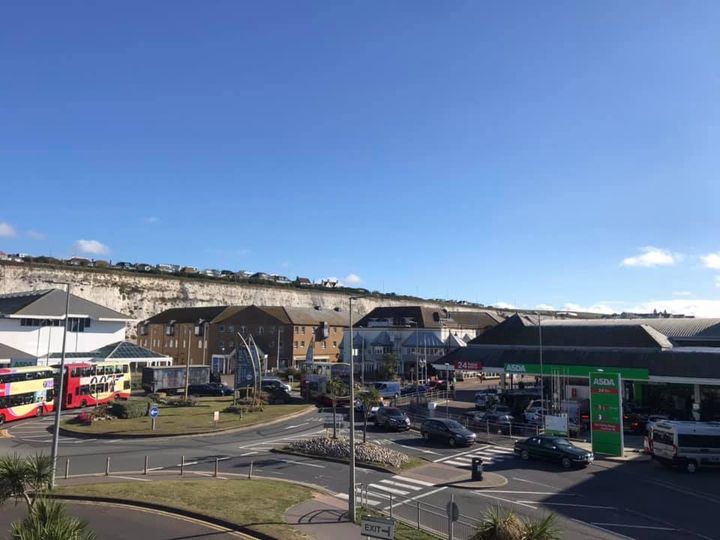
Long queues formed at the city’s petrol stations this morning as panic buying motorists stocked up on petrol – and potentially blocking emergency services.
Transport Secretary Grant Shapps told motorists to “carry on as normal” after BP was forced to close down a handful of its forecourts because of the HGV driver shortage.
But tailbacks at both Brighton Asdas and Sainsbury’s in West Hove formed – even though those supermarket chains are unaffected.
At lunchtime, Sussex Police warned that blocked roads pose a serious public health risk.
It tweeted: “We are aware of drivers queuing at petrol stations across Sussex.
“Keeping highways clear is essential for emergency services to respond to incidents and hindering them poses a serious public health risk.
“Please follow the latest government guidance around the buying of fuel.”
Mr Shapps told Sky News: “The advice would be to carry on as normal, and that is what BP is saying as well.”

On Thursday BP said it had closed a “handful” of its petrol forecourts due to a lack of available fuel.
A “small number” of Tesco refilling stations have also been affected, said Esso owner ExxonMobil, which runs the sites.
He said: “As of last night, five petrol stations on the BP network out of 1,200 or 1,300 were affected.
“I’m meeting this morning with Tesco and I’m sure they’ll give me the update for themselves.
“None of the other retailers said they had any closures.”
He added: “The others, Asda, Morrisons and other supermarkets, are saying they have no problems, as have other petrol companies.”
On BBC Radio 4’s Today programme Mr Shapps promised he would do what is needed to ensure that petrol gets to drivers.
“I’ll move heaven and earth to do anything that’s required to make sure that lorries carry on moving our goods and services and petrol around the country,” he said.
He denied that Brexit was the culprit in the UK’s recent shortage of lorry drivers, arguing that the split from the European Union has helped the government react.
“Not only are there very large and even larger shortages in other EU countries like Poland and Germany, which clearly can’t be to do with Brexit, but actually because of Brexit I’ve been able to change the law and alter the way our driving tests operate in a way I could not have done if we were still part of the EU,” he said.
“So, Brexit actually has provided part of the solution of giving more slots available for HGV (heavy goods vehicle) tests and there are a lot more, twice as many, tests available now than before the pandemic, a large proportion of those we’ve only been able to do because we are no longer in the EU.”
At a meeting a week ago BP reportedly told the government that the company was struggling to get fuel to its forecourts.
Its head of UK retail Hanna Hofer described the situation as “bad, very bad”, according to a report by ITV News.
BP had “two-thirds of normal forecourt stock levels required for smooth operations”, she said, adding that the level is “declining rapidly”.
The AA has said that most of the UK’s forecourts are working as they should amid worries over supply of petrol at some sites.
“There is no shortage of fuel and thousands of forecourts are operating normally with just a few suffering temporary supply chain problems,” said AA president Edmund King.
“Fridays and the weekend always tend to be busier on forecourts as drivers either combine filling up with shopping runs, prepare for weekend trips or refuel for the start of the new working week.
“Drivers should not fill up outside their normal routines because, even if the occasional petrol station is temporarily closed, others just down the road will be open.
“It is now clear that there have been occasional delays over recent weeks that have been managed with hardly anyone noticing. This was a manageable problem.”
On Thursday Rod McKenzie of the Road Haulage Association trade body said that the government had allowed the driver shortage to get “gradually worse” in recent months.
“We have got a shortage of 100,000 (drivers),” he told BBC’s Newsnight.
“When you think that everything we get in Britain comes on the back of a lorry, whether it’s fuel or food or clothes or whatever it is, at some point, if there are no drivers to drive those trucks, the trucks aren’t moving and we’re not getting our stuff.”
He added: “I don’t think we are talking about absolutely no fuel or food or anything like that, people shouldn’t panic buy food or fuel or anything else, that’s not what this is about.
“This is about stock outs, it’s about shortages, it’s about a normal supply chain being disrupted.”









Absolute ******g morons.
Probably run out of toilet roll from last year.
Why are some people SO stupid???
The answer don’t use cars. Folk should use bikes and walk. Forgot pollution and enjoy the sea air. Listen to the greens and extinction rebellion. Mindfulness over motors
So I’m going to walk or cycle the 120mile trip I have to make tomorrow? Don’t be completely stupid.
You seem angry. I would suggest mindfulness. One of our workmen had anger issues he is now super chilled. Try it.
Not angry. Just fed up with stupid people.
You probably would find meditation helpful.
Its what happens when you run an industry and dont invest in training. Its happen all over europe and this has been on the cards for at least 10 years.
Bosses believe they can just buy skilled people and not bother developing them from the ground up.
So true.
Bliar did away with apprenticeships by insisting on Uni courses.
WE are suffering because of the huge number of unemployable students.
There is a limit to how many HGV drivers need a degree in nail painting.
Time for a revolution in eeducation and back to basics.
Of course it’s Tony Blair’s fault. Nothing to do with any of the governments of the last ten years 🤣🤣🤣🤣🤣🤣🤣
But the rot set in with Blair, with his misguided obsession with sending every young person on a university course, leading to a crisis where many became unemployable. Many of the Mickey Mouse courses, and their degrees, turned out to be utterly useless. Previously the apprenticship plan worked perfectly well, with many young people aquiring the necessary skills that have lasted them throughout their careers. A skilled plumber will never be out of work, which is hardly the same for a graduate of many of the university courses.
And why did it become necessary for nurses to have to go on a degree course? The old system of training for nurses worked perfectly well.
Exactly Lisa…people love to blame Blair for everything. Too easy…they need to come up with better ways to explain why we are where we are…the vanity of Cameron and the referendum, Boris…well. They both make Blair look brilliant!
Regarding nurse training – we have a GP crisis. Rightly or wrongly, in response, nurses need to have a scientific degree – they need to understand how the body works, how medication works, how medications will interact with each other…the list goes on. A nurse can’t learn that ‘on the job’, I’m afraid. 12 hour shifts are stuffed full of actually taking care of patients. Lecture time is to learn about anatomy, physiology, as well as everything else a nurse needs to know, nowadays. Many’traditional’ doctor jobs are now done by nurses, both in practices and on wards. That’s the reality.
Not GP surgeries anymore…medical centres. Nurses will be (rightly or wrongly) doing many more GP ‘jobs’ in the future. Because we don’t have enough GPs (or nurses for that matter!).
The solution? We invest in training, recruiting, nurturing GPs and Doctors…then your Nurses won’t need to have degrees.
How is this possible when cycle lanes are the cause of congestion? Did the council put in cycle lanes outside all the petrol stations?? Obviously it couldn’t be because there’s too many cars on the road, only idiots think congestion is caused by *cars*.